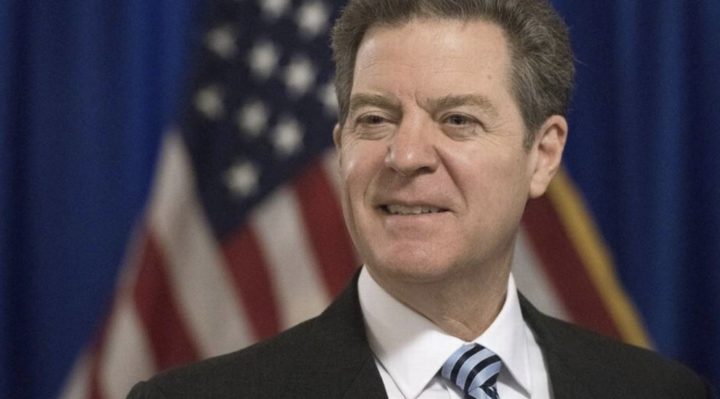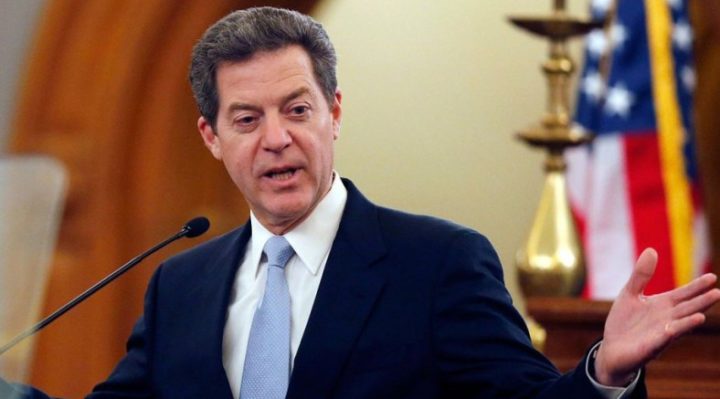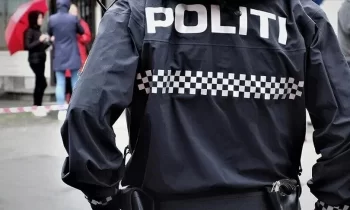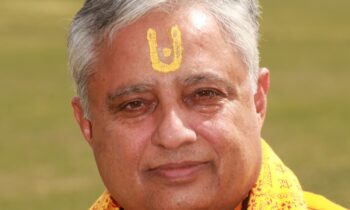U.S. Ambassador at Large for Religious Freedom Sam Brownback said Friday that the Vatican’s agreement with China on the appointment of bishops ought to be made public so that it can be evaluated.
In a telephone briefing with reporters on Friday (July 12), Sam Brownback, the U.S. ambassador-at-large for international religious freedom, cited efforts in Iraq, where a partnership that includes the U.S. Agency for International Development has begun to assist “the redevelopment and repopulating of northern Iraq by Yazidis and Christians that had been run out during ISIS.”
He also pointed to the International Religious Freedom Fund, established at last year’s ministerial to help religious persecution victims, for which the department has collected millions of dollars from donors. He said money from that fund was “offered in Sri Lanka after the Easter bombings,” in which more than 250 people were killed in terrorist attacks on churches and hotels.

“Our effort is to stir actions. We want to see really a global grassroots movement around religious freedom,” said Brownback. “We want to get the various faiths to bind together and to stand for each other’s freedom of religion.”
“There is no common theology in this discussion, but it is towards a common human right,” he said.
“And that human right is that everybody is entitled to be able to practice their faith peacefully and without fear.”
“Unfortunately China has a bad record,” he said, citing human rights violations in China’s Xinjiang province, home to many ethnic and religious minorities, government interference with Tibetan Buddhism, and the persecution of China’s Christian population, including the so-called “underground” Catholic community, who are loyal to Rome but not registered with the Chinese government.

“For those reasons the Chinese government will not be invited,” he said. Representatives from Iran and from China’s nearby neighbor North Korea are also missing from the guest list.
“Iran has shown no interest whatsoever in being an openly religiously free country,” he said, voicing hope that they would step up efforts to ensure religious freedom. However, this is “not the indication of the Iranian government whatsoever,” he said.
“Our effort is to stir action,” Brownback said. “We want to see a global, grassroots movement around religious freedom. We want to get the various faiths to bind together and to stand for each other’s freedom of religion,” because “every religion that is a majority is a minority somewhere else.”
Below is a full rush transcript of the press conference by Sam Brownback, Ambassador at Large for International Religious Freedom.
Ambassador Brownback : Thanks for your interest in this Ministerial to Advance Religious Freedom.
This will be the biggest religious freedom event ever held in the world. It’s really two events. First two days will be religious leaders and civil society activists gathered together here at State Department to discuss latest issues on religious freedom. Final day of it will be governments. We’ve had over one 115 invited foreign ministers and a number of other delegates present to discuss and to state what sort of actions that they’re going to be taking in the space of religious freedom throughout the next year. Throughout the event the highlighted portions will be those who’ve been persecuted. We’ll have over 20 people that have been persecuted for their faith– of all types of faith. The first panel that we start off with on the first day of those persecuted will include three from the Abrahamic faiths.
We’ll have the Jewish rabbi here from the San Diego synagogue shooting. We’ll have a Christian that’s been working with those in Sri Lanka from the Easter bombings that took place in that country. And we’ll have a Muslim here from New Zealand who was part of those who were attacked in the mosque attacks at Christchurch and other places in New Zealand. Probably the best known people that are persecuted for their faith that’ll be here will be Nadia Murad. She’s the Nobel Peace Prize winner that is a Yazidi from northern Iraq and, of course, unfortunately experienced the horrific genocide that ISIS did towards the Yazidis and Christians in northern Iraq. And then Andrew Brunson will be here speaking as well– Andrew Brunson the U.S. pastor that was held in a Turkish prison for two years and was eventually released.
Our effort is to stir actions. We want to see really a global grassroots movement around religious freedom. We want to get the various faiths to bind together and to stand for each other’s freedom of religion. Our effort is and towards a common theology. There is there is no common theology in this discussion but it is towards a common human right. And that human right is that everybody is entitled to be able to practice their faith peacefully and now without fear. And this is a universal human right that was set forth in the U.N. Declaration of Human Rights. It’s in most countries’ constitution, and yet 80 percent of the world experiences some form of religious persecution. And often for religious minorities in various countries it can be deadly. The number of killings that have taken place of people of faith is unfortunately very high. A recent British report had Christian persecution and deaths at the highest levels ever. So we really hope to start this grassroots movement.
We’ll be pushing to have religious freedom roundtables established in countries around the world. This is where various religious adherents get together to stand for each other’s religious freedom. We anticipate and hope there’ll be announcements of follow-on meetings in various regions around the world where other countries will host gatherings like this to host in a regional context or a specific issue context things about religious freedom like reform of textbooks so that religious minorities aren’t denigrated.
We want this grassroots movement to be global. As I mentioned to uniting the faiths to stand for each other– every faith that’s a majority somewhere is a minority somewhere else. And we hope we can get this grassroots movement somewhat like the human trafficking effort has really gone global and in a grassroots way as well.
We anticipate there’ll be announcements by various governments including our own on the Ministerial Day, Thursday July 18th , of various actions to take place. In addition to all of this there will be 80 sidebar events done around the margins of the ministerial. These are sponsored by activist groups. There’ll also be a second stage because we can’t accommodate everybody here at State Department, we’ve had to close registration several weeks ago because we’re just over capacity. But the second stage will be done at George Washington University and hosted there by the Loeb Institute.
They’ll also have a youth track and that second stage can accommodate the overflow. If you’re interested in finding out more about the sidebar events now you can go on the international religious freedom roundtable website. That website is IRFroundtable.org. Again that website is IRFroundtable.org to get the list of these sidebar events and they really span a gamut and span the various faiths and issues as well.
The entire event will start actually on Monday July 15th with the start with a meeting of the victims at the Holocaust Museum followed by a private tour and a ceremony there. We’ll have a victim of the Holocaust speak briefly at that. I found this to be a very moving event last year when some of the victims of religious persecution saw pictures on the wall that the uniforms that looked like the uniforms they were in in prison and one of them said, “Evil is not very imaginative it’s doing the same thing.” And it’ll end on the Thursday evening at the African-American museum with a large reception at that time. We’re very excited about the event. This is a major foreign policy initiative of the United States. It’s an issue that has not gotten its due as far as focus around the world, particularly given really the amount of persecution that’s been taking place in recent years and growing. And we want to push back on that and start a movement pushing the other way. We hope that this really is the launch of that global grassroots movement for people to stand for religious freedom and to stand for each other’s religious freedom. With that let me open up for questions.
Question: We intend to have some level of freedom, religious freedom as compared to the past, depending on which part of the country you come from I can identify or I can assume what kind of religion you practice. So how dangerous do you think that would be or what are the opportunities for the country community as we are experiencing some ethnically motivated clashes in the country, you might be aware of that. So how does it affect the freedom of religion that people are identified by, their religion is identified by the topography that they are from ?
Ambassador Brownback: Well it’s a good question and it’s one we see happening in various parts of the world. I’d say that the key then in a situation like what you’re in is this notion that we should stand for each other’s religious freedom. So if you’re in a part of the country where Christianity is the dominant faith but you’re a Muslim, the Christian should stand- the Christian leaders in particular – we want and need to have standing for the right of the Muslims to practice their faith freely and without fear. And if you’re in the Muslim part of the country or tribal area we need the Muslim leaders to stand up for the Christians’ right to practice their faith freely and to protect them.
That’s why we’re asking for these religious freedom round tables to be stood up in places all over the world. We stood one up in Nigeria earlier this year and we’re very hopeful for that. Nigeria is a country that has many different divides and one of them is religious divide. But that may not be what powers the violence but it can be a factor and often is a factor in the violence and that’s why we really need you know these religions really to practice their faith in that most call for loving one another and caring for one another and certainly respecting each other.
And we need that to take place and we hope to push that here and push it aggressively because religion is upstream from politics and government. It’s a foundational piece of a society. We need that that religious component to really press for respect and care for people of other faiths and loving people of other faiths.
Question: Will there be representatives of the Uighurs to present their views as survivors of religious persecution? On the other hand, were Chinese officials invited to explain their point of view and what is it you are asking for?
Ambassador Brownback: There will be Uighurs here and presenting their view. The Chinese government was not invited. We invited nations to this that are like-minded, that support religious freedoms, or are aspirational to really engage more religious freedom in their nation. And unfortunately China has had a bad record, is a country of particular concern. In our report that was just issued recently we had a full section on Xinjiang. We have a full section on Tibet. What’s taking place there towards the Tibetan Buddhists. What’s happening to the Uighur Muslims. And we had a large section too on what’s happening to the Chinese Christians particularly the house church and the underground Catholics and on what’s happening to Falun Gong. So for those reasons the Chinese government will not be invited.
Question: A very important challenge to promoting religious freedom in the world is the amount of cooperation among countries and at the moment, as you also know, with the rise of tensions between Iran and the United States, are you hopeful that you can help – the United States – can help improving religious freedom in Iran while we know that the Iranian officials deny any violation of religious freedom in the country?
Ambassador Brownback: I don’t know what that denial is based upon by the Iranian government itself of denying that there’s no religious violations. Iran has one of the worst records on religious freedom in the world. Many of their Iranian religious minorities– this would include Baha’is, Christians, Jews, Zoroastrians, Sunni, Sufi, Muslims– are facing substantial harassment, imprisonment for their beliefs, blasphemy laws. Proselytizing of Muslims in Iran is punishable by death. Even then really, February of last year, the Iranian authorities detained over 300 Sufi dervishes after police even opened fire on them during a demonstration to protest the house arrest of one of their spiritual leaders. Really the list goes on and on of what’s taking place in Iran. So Iran has shown no interest whatsoever in being an openly religious free country. We’ve stated that in our report. They as well not been invited and we would hope they would step up as a nation and say: “We’re confident enough in our own faith that we can allow other faiths to practice here and be able to work in peace together.” But that’s not been the indication by the Iranian government whatsoever.
Question: Does the United States government have any plan to cooperate or to work on the religious freedom in Iran? What are the main challenges for the United States government?
Ambassador Brownback: I think the main challenge is to get any willingness on the part of the Iranians to even discuss the issue. There’s been no indication whatsoever of interest to address the issue whatsoever by the Iranian officials.
Question: And so is there any plan on behalf of the United States government to overcome this issue?
Ambassador Brownback: They are a country of particular concern. We do have sanctions associated with this to try to press the Iranian government. But at the end of the day it’s going to have to be the Iranian officials themselves that decide that they want to abide by the U.N. Charter of Human Rights and provide for that and if they are unwilling it’s pretty hard, other than the tactics we’ve already used, to press them to do more.
Question: Ambassador you mentioned there will be about 20 people who will make testimony about the religious persecution that they suffered. Among them, is there any North Korean defector who shared their testimony like Ji Hyeona last year?
Ambassador Brownback: Let me look on my list to see if we have somebody from North Korea. We had an excellent, as you noted, presentation last year. Somebody who had been able to escape out of North Korea and was persecuted for her faith.
Yes we do have a North Korean that was able to get out of North Korea that will be speaking to the overall group.
Question: I wanted to ask you a question following up on China and the Vatican in this agreement they have on the appointment of bishops. In the past you’ve been very critical of that saying that it could make religious persecution in China worse. Many people have called for the details of that agreement to be made public so that it can be evaluated.
Would you still state that religious persecution has been made worse in China because of this deal and do you agree that the terms of that deal should be made public?
Ambassador Brownback: Well it has certainly seemed like to me that it’s in everybody’s interest for the agreement to be made public so people can appraise it and it can be subject to the light of day and people understand what the parameters of it are.
And I don’t know that I can state, or should have, that it’s made things worse. The Chinese government has taken these actions. The Chinese Communist Party has taken these actions, I should refrain, because the regulation of religion has moved from the government to the Chinese Communist Party two years ago and more aggressive actions have happened towards virtually every faith in China.
So I don’t know that it’s made it worse. It certainly, I believe, is true that the agreement should be made public.
Question: Beyond declarations and conversation, what specific policy accomplishments have been made at the result of the first Ministerial? Especially with continued concerns about the Uighurs in China and the Rohingya in Myanmar ?
Ambassador Brownback: Let me go through some of the things that have come out of the First Ministerial. We’ve started a development track and you’ll see that in full and fuller bloom at this Ministerial where now there are development agencies that are focusing on religious freedom. This particularly happened in northern Iraq working with the redevelopment and repopulating of northern Iraq by Yazidis and Christians that had been run out during ISIS. This is partially a response to a conference it was held by the U.K. at Wilton Park in November of last year and a strong push by AID here in the United States.
We put forward last year the Potomac Plan of Action. And in that as well there was the establishment of an International Religious Freedom Fund. This is to help victims of religious persecution. There is five million dollars in that fund. And we hope to have more funds coming into that and that fund has been offered to some places already for its use. It was offered in Sri Lanka after the Easter bombings. There have been a number of new ambassadors on religious freedom established by other countries to get a stronger effort put forward and more united by more voices.
Last year we saw the U.K., Germany, Mongolia create special religious freedom ambassadors and this year Taiwan appointed one. There was called for in the agreement last year, a global day of remembrance of victims of religious persecution and recommitment really to action. Poland took that forward to the U.N. General Assembly and it’s established August 22nd now as the Day of Remembrance. And then a series of international religious freedom roundtables. I mentioned that in my comments our efforts that we really hope to get this driven down more to nations and grassroots. Ten of those have been stood up around the world and eight are planned. The ten stood up I’ve got a series of those countries that we really hope to get a lot more of those because that’s the effort to get this grassroots in an indigenous setting.
So those are some of the accomplishments out of last year’s Ministerial. And then also I would just point out the number of things that didn’t happen negative in some places has been positive. I was meeting with a Baha’i man in Tennessee and he was saying “Well because of your advocacy there have been fewer Baha’i killed particularly in countries like Iran that have been very brutal to the Baha’i because the international community is watching and pushing back.”
So even though there’s been way too many killings, taking that have happened without the international effort I think there will be, unfortunately, there’d be more.


